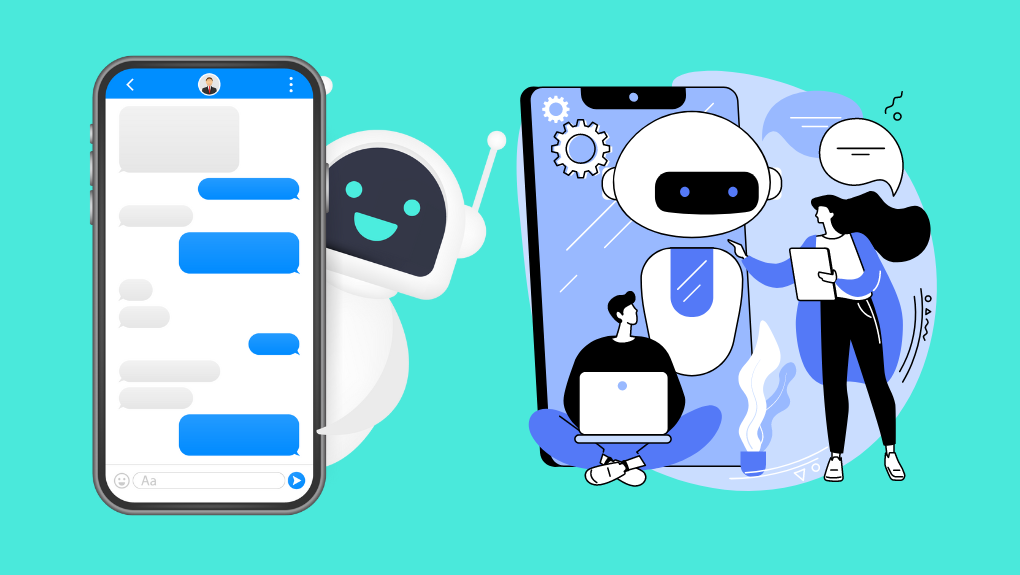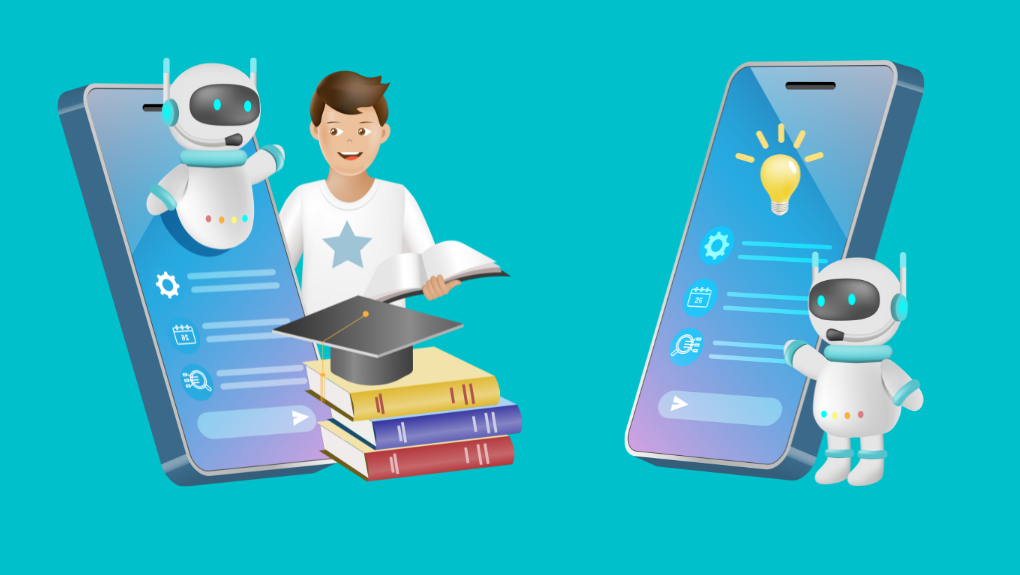How AI-Powered Web Development is Transforming the Digital Landscape
As the great futurist Elon Musk said:
"AI is not just the future; it's the now. In web development, harnessing the power of AI is akin to having a co-pilot that enhances our abilities, making the online experience not just functional but delightful and futuristic."
AI is a game-changer, especially in the web development world. Predictions indicate that the AI market will reach nearly $60 billion by 2025 (Zipdo). AI goes beyond enhancing our online experiences; it revolutionizes how websites are built and managed.
Simply put, AI makes websites smarter and more efficient. It's not just about aesthetics; it's about improving website functionality, whether you're shopping, reading, or browsing. This blog explores how AI is reshaping web development, making it simpler, more exciting, and filled with possibilities.
Let’s get started!
Revolutionizing Digital Landscape with AI in Web Development

AI is a formidable ally.
When it comes to showcasing the bright side of AI in revolutionizing the digital landscape, one compelling purpose is its unique potential to raise consumer reports.
In the end, it fosters an enticing and consumer-centric online environment. It is time to understand a few ways AI is making its mark in the web development industry. Partnering with an NLP development company or choosing to hire Flask developers ensures smarter, AI-powered solutions for your website.
1. Smart Automation
AI improves how quickly and efficiently we can make progress by handling repetitive tasks, cutting down on mistakes made by people, and speeding up the entire process. With tools powered by AI, tasks like writing code and fixing bugs become easier and faster. This lets developers focus more on creative ideas and solving complex problems.
2. Personalized User Experiences
AI examines how consumers behave and what they might like to offer in personalized experiences. AI examines how consumers behave and what they might like to offer in personalized experiences. By integrating website localization tools, you can ensure that personalized content and suggestions are also adapted to various cultural and linguistic contexts, enhancing relevance and engagement for a global audience.
Using machine learning, you can optimize your website content, upgrade it, and add suggestions in real time to match each visitor's unique interests and needs, creating a more tailored experience for everyone. Additionally, implementing website uptime monitoring ensures that your site remains accessible, allowing AI-driven personalization features to function seamlessly, even during high traffic or potential server issues.
3. Predictive Analytics for Optimization
AI algorithms predict consumer trends, helping developers improve websites and plan how to create successful connections for better performance and user engagement. Even to build successful backlinks for optimizing your content, revisiting analytics is important. By analyzing data patterns, AI aids in making smart decisions about where to place content, how to reduce loading times, and other key aspects to ensure a smooth experience for users.
4. Chatbots and Virtual Assistants
Using AI-powered chatbots and virtual assistants enhances how we interact with customers. These smart tools offer instant help, answer questions, and guide users through websites. This not only improves customer service but also makes the user interface more engaging and interactive. Full stack developers are threatened to be replaced as companies can nowadays hire remote AI developers. It will be interesting to watch the developments in artificial intelligence (AI) and large language models on whether AI can pose a serious threat to the traditional ways of full stack development.
5. Security Enhancements
AI performs a pivotal function in bolstering net security. From figuring out and mitigating capacity threats to enforcing strong authentication systems, AI algorithms constantly adapt to evolving cybersecurity challenges, supplying a proactive defense mechanism against malicious actors and ensuring information integrity on the internet.
The Transformative Impact of AI on Web Development

As per Forbes statistics, the AI marketplace predicts a 37.3% annual boom from the length of 2023 and 2030. This makes it clear that AI equipment is excessively used for internet layout and development.
The combination of Artificial Intelligence (AI) and web development is causing a big transformation, changing the digital landscape with innovation. This powerful partnership is not just a passing trend; it's a lasting force that's changing how websites are created, developed, and used.
To create the backend of a website or web-based application, software developers rely on external suppliers, such as backend services and SDK" Back-end developers work under the principle of providing a completely scalable server side. They focus on databases, back-end rationality, application programming interfaces, design, and servers to ensure the website's functionality. Additionally, knowledge of AI course is becoming increasingly essential for developers to enhance backend capabilities with intelligent automation and data processing.
You can see the impact of AI in these few ways:
1. Streamlining Processes
AI-powered tools automate coding tasks, decrease improvement time, and minimize errors. For example, GitHub Copilot, evolved through GitHub in collaboration with OpenAI, assists builders by suggesting a sequence of programming instructions primarily based on human-like language.
2. Machine Learning Algorithms
AI studies how people behave to create personalized experiences and dynamic content models. For instance, Netflix employs AI algorithms to suggest shows and movies based on what you've watched before, your preferences, and your current interactions on the platform. According to the latest survey, personalized content material hints cause a 27% boom in in-person engagement (source: Accenture).
3. Predictive Analytics for Optimization
AI-driven predictive analytics use individual trends to assist developers in improving website performance. For instance, currently, 53% of mobile users leave a website if it takes more than 3 seconds to load. Google's Page Speed Insights employs AI to analyze webpage performance and provide suggestions for optimization.
4. Chatbots and Virtual Assistants
AI is getting better thanks to something called Natural Language Processing (NLP). It's a big part of making things like chatbots and digital assistants smarter.
These tools use AI and NLP to make conversations with people more natural and engaging. For example: IBM's Watson Assistant powers AI chatbots, imparting personalized interactions and real-time support.
5. Anomaly Detection
Anomaly Detection refers to noticing unusual patterns or behaviors in data, like errors, fraud, or important events that need attention. AI identifies and mitigates protection threats by understanding how trustworthy information is in a group of data. For example: Cloudflare's AI-powered firewall protects websites from diverse cyber threats through studying site visitor patterns.
The transformative effect of AI on net improvement is palpable, with clever automation, personalized personal experiences, predictive analytics, and greater security features at the forefront.
AI for Dynamic Web Solutions

1. Personalized User Experiences
Strategy: Brands leverage AI to research consumer facts and behaviors, offering personalized studies that resonate with both male and female preferences. This includes tailoring content material, pointers, and consumer interfaces to beautify engagement as per the concerned demographic.
AI can help you experience seamless collaboration and easy reporting with customized client portal service, placing you on top of things in your customer interactions and improving your customer brand experience.
2. Chatbots for Real-time Customer Interaction
Strategy: AI-powered chatbots provide immediate and green client support, answering queries, offering information, and guiding users. This enhances consumers' brand communication and also frees up human assets for more complicated responsibilities.
Example: Shopify:
Shopify has Kit, an AI assistant that facilitates traders with one-of-a-kind obligations like marketing and order processing. The kit is aware of consumer questions about the usage of herbal language and offers beneficial suggestions. Merchants' usage of Kit has saved time and gotten more carried out because the AI assistant handles recurring obligations smoothly.
3. Predictive Analytics for Website Optimization
Strategy: AI-pushed predictive analytics examine huge datasets to expect consumer conduct and enhance internet site factors, which include content, design, and navigation. Furthermore, it helps in upgrading your business data privacy. This allows manufacturers to make fact-based choices for stepped-forward consumer enjoyment.
Example: Amazon:
Amazon makes use of clever laptop packages to examine what you study and purchase. These packages include what you may purchase in the future. This fact allows Amazon to advocate merchandise you would possibly like and display advertisements that cater to your interests. Amazon`s use of clever generation in predicting what clients need has helped them promote extra and maintain clients coming back.
4. Dynamic Content Generation
Strategy: AI content tools make it easy for manufacturers to create and replace content material automatically, adjusting it primarily based on what clients like, modern trends, and real-time information.
Example: The Washington Post
The Washington Post makes use of a device referred to as Heliograf, powered by AI, to automate the era of information articles. Heliograf analyzes facts and creates personalized, localized, and well-timed content material. This allows the information outlet to cover a broader variety of testimonies and interact with readers with applicable content material, ultimately increasing consumer interaction.
5. Enhanced Security through AI-Powered Solutions
Strategy: Brands use AI to reinforce net protection by figuring out and mitigating capability threats in real-time. Privileged Access Management (PAM) is a relevant way to enhance security by managing privileged access, ensuring that only authorized individuals can access critical systems. AI algorithms constantly adapt to evolving cybersecurity challenges, offering proactive protection mechanisms. By integrating PAM with AI-driven solutions, brands can achieve more robust threat detection and ensure compliance with security protocols.
Example: IBM Watson for CyberSecurity
IBM Watson for Cyber Security makes use of AI to research widespread quantities of protection facts, hit upon patterns, and become aware of capability threats. This proactive technique allows businesses to beef up their cybersecurity posture. By leveraging AI-pushed protection solutions, teams can make themselves stronger against cyber threats and protect important information easily.
Conclusion
To conclude, the transformative effect of AI-powered internet improvements in the virtual world is undeniable. From more desirable consumer stories to streamlined workflows, the ability is vast. We`ve explored the performance gains, personalized interactions, and adaptive layout skills that AI brings to the forefront.
As we embody this evolution, marketers can harness the energy of AI for web development purposes. Start your journey into digital transformation by using AI tools and methods, and staying ahead of the curve. Embrace the future of web development—one wherein AI propels us right into a realm of countless possibilities. Take step one today.




